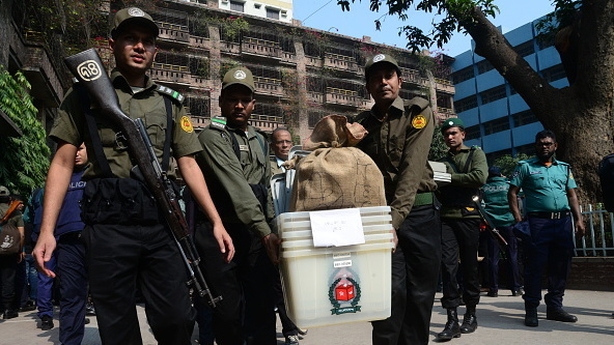Bangladesh Prime Minister Sheikh Hasina appeared headed for a landslide win in a general election that was marred by clashes between rival supporters that killed 14 people and opposition claims of rigged voting.
Early results showed Ms Hasina's Awami League racing into a clear lead, quickly securing 61 seats against one for the opposition - some by tens of thousands of votes - according to Channel 24, which is compiling results from around the country.
The alliance of parties running against Ms Hasina branded the election "farcical" and urged the country's election commission to void the results.
"We are demanding that a fresh election is held under a neutral government as early as possible," Kamal Hossain, who heads the coalition, told reporters.
Deadly violence and bitter rivalry that marred the election campaign spilled over into voting day, even as authorities imposed tight security with 600,000 troops, police and other security forces deployed across the country.
Ten people were killed in clashes between Awami League and the main opposition Bangladesh Nationalist Party (BNP) supporters, police said, while three men were shot by police who said they were protecting polling booths.
An auxiliary police member was also killed by armed opposition activists, according to officials.

Ms Hasina, 71, has been lauded for boosting economic growth in the poor South Asian nation during her decade in power and for welcoming Rohingya refugees fleeing a military crackdown in neighbouring Myanmar.
But critics accuse her of authoritarianism and crippling the opposition - including arch-rival and BNP leader Khaleda Zia who is serving 17 years in prison on graft charges - to cling on to power.
The BNP-led opposition alliance accused Ms Hasina's party of using stuffed ballot boxes and other illegal means to fix the result, which was to be officially announced tomorrow.
BNP spokesman Syed Moazzem Hossain Alal told reporters there were "irregularities" in 221 of the 300 seats contested.
"Voters are not allowed to enter booths. Especially women voters are being forced to vote for the boat," Mr Alal said, referring to the Awami League symbol.
A spokesman for the Bangladesh election commission said they had "received a few allegations of irregularities" and was investigating.
Authorities shut down high speed internet services during polling "to prevent the spread of rumours" that could trigger unrest.
One independent television news channel complained that its broadcasts were blocked.
Voting in the capital Dhaka was largely peaceful as convoys of soldiers and paramilitary forces were on the streets where most traffic was banned.
Ms Hasina needs 151 seats to control parliament but experts say a victory would be sullied by accusations that she hamstrung opponents.
The opposition says more than 15,000 of its activists were detained during the campaign, crushing its ability to mobilise support.
Human Rights Watch and other international groups said the crackdown created a climate of fear which could prevent opposition supporters from casting ballots.
The United States raised concerns about the credibility of the election while the United Nations called for greater efforts to make the vote fair.
Seventeen opposition candidates were arrested over what they claim are trumped-up charges while another 17 were disqualified from running by courts, which Ms Hasina's opponents say are government controlled.

